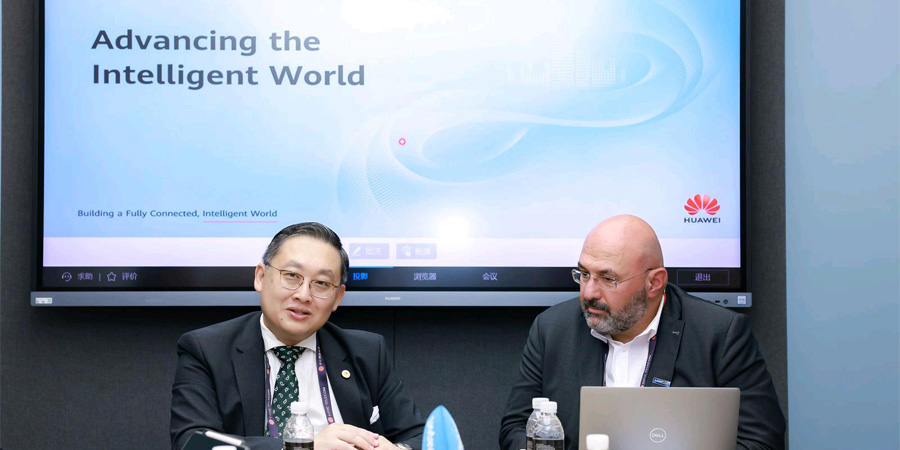In a brief media session during MWC Shanghai 2024, Aloysius Cheang, Chief Security Officer, Huawei UAE and Jawad Abbasi, Head of MENA, GSMA, addressed some of the key topics surrounding digitalization in the 5G era.
Touching upon Huawei’s 5G-Advanced (5G-A) and AI solutions presented during MWC Shanghai, Cheang highlighted the importance of harnessing the capabilities of AI in the 5G era.
He mentioned that Huawei’s Cloud provides access to innovative AI-enabled applications that can be used to develop various new AI models across business sectors. He added that Huawei Cloud native security is embedded with AI-powered infrastructure, which integrates security into cloud services and assets. This allows for real-time threat awareness and rapid responses.
Harnessing the capabilities of AI, particularly generative AI (GenAI) in telecom networks, Huawei has recently introduced an upgraded Autonomous Driving Network (ADN) solution, now powered by the company's Telecom Foundation Model. This solution encompasses five role-based copilots and five scenario-based agents which work together to enhance network value in service enablement, maintenance, and experience assurance.
APIs for the Digital Economy
Discussing the value and importance of APIs for the digital economy, Abbasi said, “APIs unleash the potential of edge computing, the investment of the operators and makes it easy to offer services.”
He further stressed the importance of the GSMA’s Open Gateway initiative in standardizing APIs for more efficient interoperability among operators and developers. “Since its launch in 2023, 49 operators are already part of the initiative and operate 241 mobile networks around the world, representing a share of 66% of global connections,” Abbasi noted.
The GSMA’s Open Gateway initiative will be essential for carriers to pursue experience-driven operations based on diverse 5G-A network capabilities. The Open Gateway defines unified standards, billing modes, and standardizes a global ecosystem within an interoperable framework.
Huawei has been supportive of the API framework and has developed various applications with carrier partners, such as the service appointment API catering to both consumer (toC) and business (toB) mobile live-streaming, which provides a guaranteed experience for live-streamers as per their requirements. Another application favored by insurance companies is the New Calling API, which integrates HD video, interactive data, content sharing, and AR marking into loss assessment, shortening the process from 2 hours to just 10 minutes.
5G in Emerging Economies
The briefing then highlighted the development of 5G in emerging economies such as Pakistan. The panel emphasized the importance of utilizing the “vast repository of best practices” that organizations such as the GSMA have already built.
Cheang expounded upon the importance of building trust and utilizing facts that are verifiable based on common international standards that can be universally applied. He further emphasized the need for vendors, regulators and operators to abide by the standards of the Network Equipment Security Assurance Scheme (NESAS) developed by 3GPP and the GSMA.
Cheang also highlighted the GSMA’s Mobile Cybersecurity Knowledge Base (MCKB) to help stakeholders manage risks in the 5G ecosystem by providing essential insights for their risk management strategy and guidance covering best practices and risk mitigation measures.
The panel reflected on the importance of data centricity and user data control as a key component in the digital economy.
Middle East and Central Asia ICT Policy
The session, ‘Middle East and Central Asia ICT Policy and Governance Forum moderated by the GSMA earlier in the day was discussed at length. Regulators and operators from the Middle East, North Africa, and Central Asia, including senior officials from the China Academy of Information and Communications Technology and Huawei discussed industry policies, successful practices, and valuable insights on key industry trends.
Under the theme "Driving Policy and Innovation to Shape Our Digital Future," the forum discussed the importance of spectrum, optical, and datacom policy planning and explored how carriers, enterprises, oversight agencies, and regulators can enhance mobile security capabilities and provide guidance for risk management strategies. Notably, however, usage gap, poverty and lack of education was regarded as some of the setbacks in the acceleration of ICT ecosystem growth.
The importance of investing in data centers and convening the ICT ecosystem remained a recurring theme of the discussion. The importance of leveraging 5G-FWA and 5G-Advanced use cases in domains such as smart cities, tourism, healthcare, new industries, and more, were deemed vital support infrastructures that must be considered throughout the development of the ‘gig economy.’
Latest Coverage: 5G-A: Paving the Way for Shared Success











